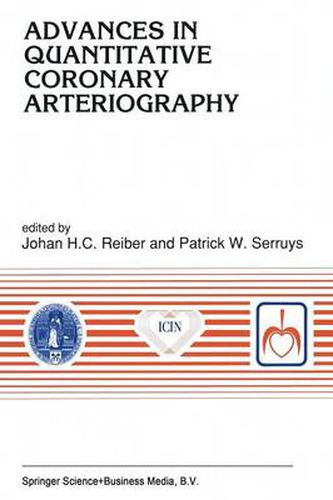Readings Newsletter
Become a Readings Member to make your shopping experience even easier.
Sign in or sign up for free!
You’re not far away from qualifying for FREE standard shipping within Australia
You’ve qualified for FREE standard shipping within Australia
The cart is loading…






This title is printed to order. This book may have been self-published. If so, we cannot guarantee the quality of the content. In the main most books will have gone through the editing process however some may not. We therefore suggest that you be aware of this before ordering this book. If in doubt check either the author or publisher’s details as we are unable to accept any returns unless they are faulty. Please contact us if you have any questions.
In this fourth book in the series on quantitative coronary arteriography (QCA) with the earlier three volumes published in 1986, 1988 and 1991, the latest developments in this exciting field are covered. Both the methodolog ical and clinical application aspects of these advances are presented in a comprehensive manner in a total of 37 chapters by world renowned experts. The book is subdivided into a total of eight parts, beginning with the more methodological issues, such as QCA and other modalities (3 chapters), cine film versus digital arteriography (3 chapters), quality control in QCA (4 chapters), and coronary blood flow and flow reserve (3 chapters). Since QCA has been well established as the technique for the assessment of regression and progression in atherosclerotic disease, and of restenosis after recanaliz ation procedures, major clinical trials in both groups are described extensively by their principal investigators in a total of 11 chapters. In addition, the QCA results after the application of various recanalization techniques are presented in another eight chapters. In the last part the experiences with various intracoronary prostheses with the emphasis on QCA are discussed in five chapters. This large increase in application oriented chapters means that QCA is well alive and gaining momentum. Although the accuracy and precision of the analytical methods steadily improve with the increasing complexity of the algorithms, there is still always the human factor involved in these processes in terms of frame selection, segment definition, etc.
$9.00 standard shipping within Australia
FREE standard shipping within Australia for orders over $100.00
Express & International shipping calculated at checkout
This title is printed to order. This book may have been self-published. If so, we cannot guarantee the quality of the content. In the main most books will have gone through the editing process however some may not. We therefore suggest that you be aware of this before ordering this book. If in doubt check either the author or publisher’s details as we are unable to accept any returns unless they are faulty. Please contact us if you have any questions.
In this fourth book in the series on quantitative coronary arteriography (QCA) with the earlier three volumes published in 1986, 1988 and 1991, the latest developments in this exciting field are covered. Both the methodolog ical and clinical application aspects of these advances are presented in a comprehensive manner in a total of 37 chapters by world renowned experts. The book is subdivided into a total of eight parts, beginning with the more methodological issues, such as QCA and other modalities (3 chapters), cine film versus digital arteriography (3 chapters), quality control in QCA (4 chapters), and coronary blood flow and flow reserve (3 chapters). Since QCA has been well established as the technique for the assessment of regression and progression in atherosclerotic disease, and of restenosis after recanaliz ation procedures, major clinical trials in both groups are described extensively by their principal investigators in a total of 11 chapters. In addition, the QCA results after the application of various recanalization techniques are presented in another eight chapters. In the last part the experiences with various intracoronary prostheses with the emphasis on QCA are discussed in five chapters. This large increase in application oriented chapters means that QCA is well alive and gaining momentum. Although the accuracy and precision of the analytical methods steadily improve with the increasing complexity of the algorithms, there is still always the human factor involved in these processes in terms of frame selection, segment definition, etc.